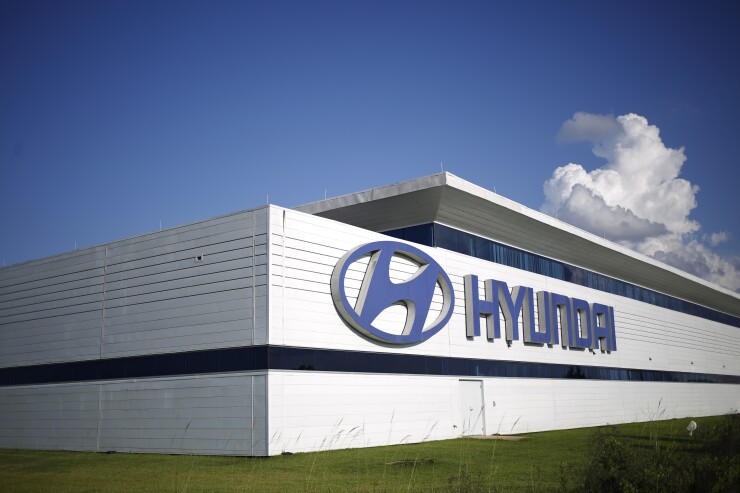Hyundai Capital America has upped the credit quality of receivables in its latest offering of $979.27 million in notes backed by auto leases, according to a presale report from Moody’s Investors Service.
The transaction, Hyundai Auto Receivables Trust 2017-B, features four senior tranches all rated triple-A, an unrated $209 million money market tranche, and two subordinate tranches for a combined $54 million. All but one of the tranches will pay a fixed rate of interest, with the class-A2 notes paying a floating rate of interest indexed to LIBOR.
The senior notes, including the money market tranche, are slated to mature at various dates between August 2018 and January 2022. Credit enhancement for all four of the class-A notes is 7.55%, down 15 basis points for senior notes in its last four securitizations.

Credit enhancement on the subordinate notes is also lower in this deal than in Hyundai’s securitizations since 2014-A. The class-B notes, rated ’Aa3’ by Moody’s, benefit from just 5.75% credit enhancement compared to 5.90% in the past four deals. Credit enhancement on the most subordinate tranche (rated ‘A3’ by Moody’s) experienced the biggest decrease, from 3.20% in the prior Hyundai deals to just 2.75% in this transaction. Unlike the last four deals, this deal does not offer class-D notes.
The class-B notes are scheduled to mature in February 2023. The class-C notes are the last to mature in the deal in May of 2024.
The credit quality of the lessees in the pool is strong. Borrowers have an average FICO of 749, up two points from its earlier transaction this year and the highest of any past HART transaction. Furthermore, the concentration of borrowers with FICOs lower than 650 is down four percentage points from its 2017-A deal at just 3%.
The deal also has strong vehicle diversification, according to Moody’s. Manufacturer diversification is strong; Kia’s comprise 51% of the deal, with Hyundai vehicles accounting for the rest. While Kia’s have historically not performed as strongly as Hyundai’s in the company’s ABS history, Kia loan performance in recent HART transactions has been improving.
In addition to the manufacturers in the deal, recent trends in the used car market have shown a decline in overall performance, and the transaction’s exposure to that market puts it at some risk of a higher loss severity. However, only 6% of the total pool is comprised of leases for used cars, down two percentage points from the prior deal this year and the lowest concentration since its 2015-A deal.
The average original loan term in the pool is 66 months, and approximately 62% of the pool balance has an original term of at least 60 months. Historically, longer-term auto loans do not perform as well since borrowers often end up owing more than the value of their cars as the vehicles amortize over time. However, Moody’s noted that the average FICO of borrowers with long-term loans (73-75 months) is strong at 769, which is 20 points higher than the average of the total pool.
Moody’s expects net losses to reach 2.00%, compared to 1.50% in its 2016-B securitization.
(Moody’s did not rate its 2017-A transaction, and therefore did not report loss expectations on the deal.)
Hyundai Capital America is a highly rated captive finance auto company with extensive experience originating retail installment sale contracts. The company has issued 29 securitizations since 2001.





